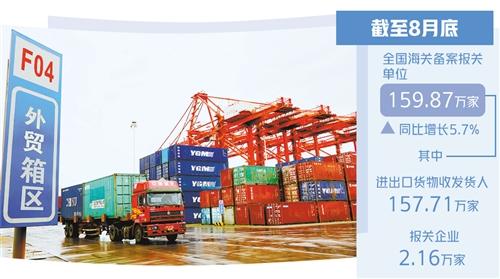Reform allows foreign trade companies to "load light and move fast"
Our reporter Gu Yang
Transport vehicles transfer containers at the container terminal of Lianyungang Port, Jiangsu.
Photo by Wang Chun (issued by Xinhua News Agency)
"Since the registration of customs declaration enterprises was changed from licensing to filing, there have been 1,238 newly registered customs declaration enterprises nationwide, an increase of 22.5% year-on-year." Wang Sheng, director of the Enterprise Management and Inspection Department of the General Administration of Customs, said in an interview with a reporter from the Economic Daily a few days ago.
On April 29 this year, the "Customs Law of the People's Republic of China" was amended to abolish the "customs declaration enterprise registration" customs administrative examination and approval items, and fully implement the filing management of customs declaration entities.
Focusing on this reform, the Customs has accelerated the promotion of the project for the convenience of the people and enterprises, and introduced measures such as "full-process network management and nationwide management", which are welcomed by the majority of enterprises.
At present, customs brokers can log in to the "single window" or "Internet + Customs" at any location across the country to submit a filing application. After the local customs has reviewed and settled, they can print the filing receipt by themselves, and the entire process is paperless online, which truly realizes the enterprise's zero Run errands and zero cost" "Apply anywhere, once."
As of the end of August, there were 1.5987 million customs filing and declaration entities across the country, a year-on-year increase of 5.7%.
Among them, there were 1,577,100 consignees and consignors of import and export goods, an increase of 5.58% year-on-year; 21,600 customs brokers, an increase of 15.89% year-on-year.
Vigorously promoting AEO (certified operator) international mutual recognition cooperation is another measure of the customs to help foreign trade companies to facilitate customs clearance.
It is reported that the goods exported by Chinese customs AEO companies to mutually recognized countries (regions) can directly enjoy many conveniences such as reduced document review, reduced inspection, priority processing, priority customs clearance in extraordinary times, and exclusive services provided by designated coordinators. measure.
Wang Sheng said that the General Administration of Customs, focusing on countries related to the “Belt and Road”, member states of the Regional Comprehensive Economic Partnership (RCEP), Central and Eastern European countries, and important trading countries, is making every effort to promote the process of mutual recognition and cooperation.
As of the end of August this year, China Customs has signed AEO mutual recognition arrangements (agreements) with 46 countries or regions in 20 economies including Singapore, South Korea, and the European Union. The number of mutually recognized countries or regions ranks first in the world.
China's AEO companies (advanced certification companies) account for about 60% of their total imports and exports to countries or regions that recognize the AEO mutual recognition.
Since last year, the General Administration of Customs has launched a pilot reform of enterprise group processing trade supervision. A series of measures have improved production efficiency, ensured the stability of the supply chain, and at the same time reduced the burden on enterprises and released reform dividends.
"At present, 20 customs have launched a pilot reform of enterprise group processing trade supervision. A total of 184 enterprises from 63 enterprise groups have participated in the pilot. The import and export value of the processing trade of the participating enterprises was 206.69 billion yuan, and the deposit or exemption was about 860 million yuan. The cost of enterprise logistics and customs declaration is 32.984 million yuan." Wang Sheng said that in the next step, the General Administration of Customs will comprehensively promote the enterprise group processing trade supervision model across the country.
The comprehensive promotion and implementation of the "Cross-border e-commerce retail import return center warehouse model" is one of the latest reform measures launched.
In this mode, domestic agents of cross-border e-commerce companies or storage companies in special customs supervision areas entrusted by them can set up special storage locations for cross-border e-commerce retail imported goods in the area to receive and sort the returned goods. It is carried out in the special customs supervision area.
According to the company's calculations, this model can reduce the overall return time by 5 to 10 days on average, alleviating the 45-day pressure on the return arrival time of cross-border e-commerce imports.
In addition, the customs will actively explore big data and intelligence, research and implement "Internet + audit", and implement invisible supervision.
At the same time, it has innovated the "multiple investigations into one" work model, integrating 69 follow-up inspection items in 7 areas involving animal and plant quarantine, commodity inspection, import and export food safety, corporate management, bonded, customs statistics, and tariffs, to achieve "one-time entry" , Check multiple things", promote the standardized operation and healthy development of enterprises, and maintain a healthy and orderly import and export order.

